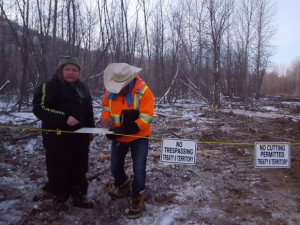British Columbia Must Respect Indigenous Peoples’ Right to Free, Prior and Informed Consent Before Proceeding with Site C Dam

If BC Hydro is allowed to build the Site C dam its reservoir would stretch for 107 kilometers along the Peace River Valley and flood the traditional hunting and fishing grounds of Treaty 8 First Nations. On January 12th B.C. Grand Chief Stewart Phillip and environmentalist David Suzuki visited the Rocky Mountain Camp where Treaty 8’s Stewards of the Land and local farmers are camped out in minus 20-degree weather vowing to prevent BC Hydro from logging an area slated to be flooded by the dam.
During the visit Grand Chief Phillip declared “It is infuriating and deeply frustrating that we continue to be confronted with this provocative and aggressive approach from BC Hydro and the Province of British Columbia when Treaty 8’s court proceedings have not even been completed and the Site C project has not been properly reviewed by the BC Utilities Commission. It is absolutely unacceptable that BC Hydro is relentlessly clear-cutting forests right now to prepare for the flooding of the Peace River Valley, which will destroy archaeological sites and eradicate prime farmland. The proposed Site C project will irreparably harm and adversely impact the environment and the Treaty 8 First Nations and all residents whose lives are entwined with the health of the land and waters.”
David Suzuki asserted “I thought we had stopped this mega-dam project 30 years ago.… Promises by government to uphold and respect treaty rights ring hollow when construction is given the green light before three on-going First Nations court cases against the dam are even finished. BC Hydro must stop its work immediately and allow the court cases to be decided.”
Instead of forcing Indigenous Peoples to have to file court challenges repeatedly, KAIROS believes the B.C. and federal governments must establish consultative process that respect Indigenous peoples’ rights to grant or withhold their free, prior and informed consent (FPIC) before resource developments are allowed to proceed on their territories. The right to FPIC is a central component of the UN Declaration on the Rights of Indigenous People which the new federal government has pledged to honour.
I have documented a clear example of government failure to respect Indigenous peoples’ right to FPIC in a study on how the former federal government gave conditional approval to the Northern Gateway pipeline. By delegating responsibility to review the pipeline application to a Joint Review Panel conducted by the National Energy Board (NEB) in association with the Canadian Environmental Assessment Agency the federal government failed to deal directly with the Indigenous groups involved.
On January 13th the B.C. Supreme Court ruled the provincial government breached its duty to properly consult the Gitga’at and neighbouring First Nations whose territories would be impacted by the Northern Gateway pipeline. Although the ruling only directly addresses the failure of the B.C. government to consult on that particular project, it has wider implications. It sets a precedent that could be applied to the Site C project, the Luutkudziiwus people’s challenge to the Prince Rupert Gas Transmission pipeline through their Madii Lii territory and the Trans Mountain pipeline as well. The lawyer for the Coastal First Nations who initiated the case says the ruling effectively nullifies the conditional approval of the Northern Gateway pipeline by the federal government in June of 2014.
Electricity from the Site C project is not required for meeting British Columbian’s needs. The province is currently a net electricity exporter. According to BC Hydro’s own forecasts supply and demand will still be in balance by 2024 as long as its current conservation plan is implemented. Power from the Site C dam would only be needed if it were required for cooling natural gas obtained through hydraulic fracturing into liquefied natural gas (LNG) for export. Using hydroelectric power for LNG has been described as using a clean power source to produce a dirty one for export.
According to the Canadian Centre for Policy Alternatives greenhouse gas (GHG) emissions from the natural gas industry could rise to between 167 to 305 million tonnes per year by 2020. A document prepared for B.C.’s Environment Minister warns that the pursuit of an LNG industry could double the province’s greenhouse gas emissions imperiling its legislated targets for GHG reductions. The document, obtained under a freedom of information request, says that emissions would rise by a minimum of 16% or as much as 100%. It says that at the high end of that range B.C.’s natural gas sector emissions would be comparable to those from Alberta’s tarsands.
John Dillon, KAIROS Ecological Economy Program Coordinator







